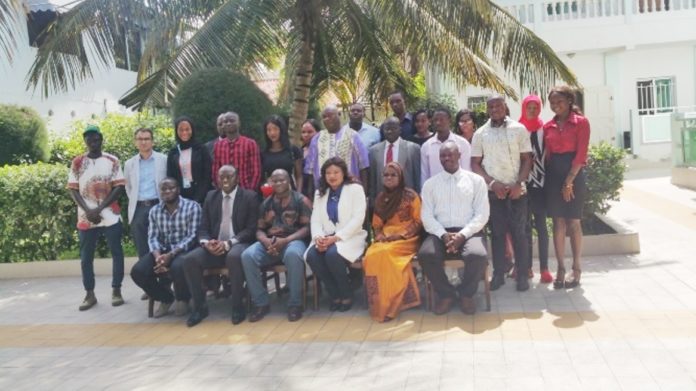By Fatoumatta K Jallow
West Africa Democracy Radio (WADR) project with support from the German Federal Office, Wednesday October 10th 2018, concluded a two day training of radio Journalist on Professional Production Techniques on Irregular Migration, at a local Hotel in Senegambia. The training is part of activities to use ‘‘Radio to Curb Irregular Migration.”
The project is part of WADR’s efforts to build the capacities of the journalists and sensitise station managers in different partner radio stations, to enhance their reporting on the irregular migration of West African youth, and it’s attendant consequences on the affected communities and countries at large. The target countries are Ghana, Gambia, Mali, and Niger. Agnes Thomasi, WADR Station Manager, said the issue of irregular migration is becoming increasingly important to focus on, because it continues to affect lives in the West Africa region, especially that of young people.
On his part, Madi Jobateh who spoke on the role of Civil Society in curbing irregular migration, described the training as timely knowing that The Gambia is one of the highest producing migrant population in Africa; that migration is a fundamental right but said what pushes people to migrate, has to be looked at to determine how to address the issue of irregular migration.
‘‘We need to look at how we are all contributing to causing migration. If we maintain a political system that promote democracy, builds strong institutions, makes governments accountable to deliver public services to people, and create opportunities, the tendency is that migration will still happen.
For Sheriff Bojang Jnr, the new President of the Gambia Press Union (GPU), the role of media in curbing irregular migration is for journalists to expose all the components because people rely on them for information. He advised journalists to do away with single stories on migration, because people migrate for various reasons.
‘‘As long as we want to curb irregular migration as journalists, there are ethical issues you can never do away with or take for granted. One has to be truthful, impartial and check facts,’’ he said.
Ebrima Sillah, the Minister of Information and Communication Infrastructure in his official statement, said irregular migration has serious implications. Sillah said as a country, we need to start the difficult discussion on where we want to go in the next five years; that migration is a fundamental human right; that we need to identify and know the things that can encourage people to stay in the country and take ownership.
‘‘We have to tackle those things that make it difficult for people stay in the country, and Government has to provide the political environment for people to have the trust to stay at home,’’ he said. He said as a Government, they have started fundamentally.
The media has to hold the Government accountable to ensure that what is budgeted for, including donor support, is well spent in transparency, so that people can benefit,’’ he highlighted.





















